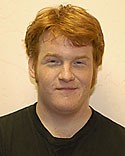To men, a woman’s mood is about as easy to read as Sanskrit. A couple of weeks ago, I got into an argument with a female co-worker; we usually get along well, but on this day I felt about as comfortable with her as a passenger feels riding with Mel Gibson. Later she confessed to me why she had been acting so unreasonable and crazy: she was on her period. Had she not told me this, I would’ve thought that I was to blame for her frustration. In truth, I had done nothing. What this episode demonstrates is that our society’s aversion to discussing sensitive and taboo subjects (such as bodily functions) in a professional context (i.e. the workplace) puts matters of propriety and decorum ahead of effective interpersonal communication. Bodily functions aren’t the only taboo subjects in a professional environment, however. Things such as race, religion, sexuality and the like are also off-limits.
I once overheard a group of student workers discussing aspects of the English language with a guest from Africa, for instance. She asked one of the biracial members of the group whether or not he was in some way “”African,”” which elicited many subdued chuckles from the other group members. They laughed because she was foreign, and thus they excused the faux pas. Had an American asked the same question, jaws would have dropped, and he/she would’ve been chided in some way. Strangely, this question was rather refreshing because it was on everybody’s mind, but fear of racial taboo prevented them from asking it.
As another example, I recall conversations with an old work acquaintance of mine. He dropped a million hints intended to effectively “”reveal”” that he was homosexual (wearing a red-ribbon for AIDS awareness; divulging that he went to get tested at a clinic; talking about how his religious father disapproves of him, etc.), but none of that really confirms anything. If he wanted to ensure that he was understood, he should have come out and simply said it.
Then again, getting a person to simply say such a thing is futile in a culture where discussion of sexuality(particularly “”unorthodox”” sexuality) is forbidden and looked upon negatively in the workplace. As a result, he was effectively forced to hide a huge part of himself from his co-workers.
There are other “”codes of conduct,”” not exclusive to the workplace, that foster misunderstanding in communication as well. Take, for instance, the unwritten “”rules”” of courtship. There’s the rule that stipulates a person must never let a guy/girl pick up on the fact that he/she is attracted, for instance. What this rule essentially forces people to do is replace the simple, elegant expression of their feelings in words with subtle hints and body language. Body language, it would seem, has a higher value than spoken language in the realm of dating. We’re reduced to communicating as animals do. Just as a cat’s hair stands up on end to show that it’s frightened, a girl licks her lips or winks to show that she’s interested in a guy.
As human beings, we have the tool of language at our disposal.
Just as a cat’s hair stands up on end to show that it’s frightened, a girl licks her lips or winks to show that she’s interested in a guy.
It’s designed to clearly convey our thoughts and feelings to other people, and yet there are rules of conduct which belie that purpose. Unless we wish to complicate our lives any further, perhaps the proper thing to do would be to abolish the formal rules of conversation and allow everything to present itself in the lucid form of the direct utterance. Perhaps then – with all of the latent sexism, racism, homophobia, prudishness and general ignorance and prejudice on the table – we can come closer to talking things out and gaining a comprehensive understanding of one another.
Andrew McGhee is a physics sophomore. He can be reached at
letters@wildcat.arizona.edu









